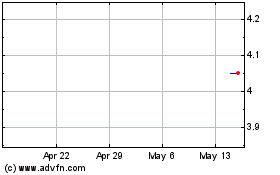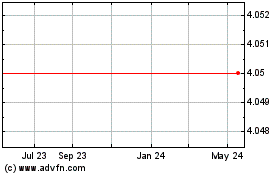Oil Search Lowers 2018 Production Forecast After PNG Earthquake
April 16 2018 - 10:02PM
Dow Jones News
By Robb Stewart and Mike Cherney
MELBOURNE, Australia--Oil Search Ltd. (OSH.AU) scaled back its
annual production forecast after oil and gas operations in Papua
New Guinea were halted by a powerful earthquake in late
February.
Production this year is now forecast to be between 23 million
and 26 million barrels of oil equivalent, Oil Search said Tuesday.
That marks a sharp cut to previous guidance of 28.5 million-30.5
million barrels, and will mean a drop in production from 30.3
million barrels in 2017.
With the expected reduction in output, the energy company said
unit production costs would be between US$10.50 to US$13.50 per
barrel of oil equivalent in 2018, higher than the previous forecast
of US$8.50 to US$9.50. The company said it would narrow the range
once there is more certainty about the production outlook for the
year.
A magnitude 7.5 quake struck Papua New Guinea's Highlands region
on Feb. 26, causing landslides that damaged roads and other
infrastructure. Local police reported that at least 125 people were
killed by the earthquake and a series of aftershocks over the
following days. Papua New Guinea's government in March declared a
state of emergency in the Hela, Southern Highlands, Western and
Enga provinces.
Operations in the Highlands and the US$19 billion PNG LNG
gas-export facility outside the capital of Port Moresby were shut
down by Oil Search and its partners shortly after the first quake
hit.
Oil Search said on Tuesday that work is continuing to restore
damaged facilities, and that 80% of company-operated oil production
would be returned to pre-earthquake levels over the course of the
second quarter.
Oil Search operates all of Papua New Guinea's producing oil
fields, though these are dwarfed by output from Exxon Mobil Corp.'s
(XOM) liquefied natural gas operation, in which Oil Search has a
29% interest. Port Moresby-based Oil Search also has stakes in a
number of undeveloped gas fields in Papua New Guinea, including
assets operated by France's Total SA (TOT).
Last week, Exxon said the natural-gas resource at the P'nyang
field owned by Oil Search had increased 84% to 4.36 trillion cubic
feet, which supported talks between venture partners on plans to
develop another production line at the PNG LNG facility and two
lines at Total's proposed Papua LNG project.
Dented by the earthquake, Oil Search said its output in the
first quarter of the year was down 36% on the prior three months at
4.8 million barrels. Sales revenue for the quarter was 24% lower at
US$295 million.
"The first quarter of 2018 was one of the most challenging in
Oil Search's and PNG's history," said Peter Botten, managing
director of Oil Search.
In bid to balance a portfolio heavily weighted to gas operations
in a single country, Oil Search late last year struck a US$400
million deal to buy interests in assets in Alaska's North Slope,
including the promising Nanushuk oil field sandwiched between two
established fields controlled by ConocoPhillips (COP).
-Write to Robb Stewart at Robb.Stewart@wsj.com and Mike Cherney
at mike.cherney@wsj.com
(END) Dow Jones Newswires
April 16, 2018 21:47 ET (01:47 GMT)
Copyright (c) 2018 Dow Jones & Company, Inc.
Oil Search (ASX:OSH)
Historical Stock Chart
From Oct 2024 to Nov 2024

Oil Search (ASX:OSH)
Historical Stock Chart
From Nov 2023 to Nov 2024
